Once, I went to Mpulungu
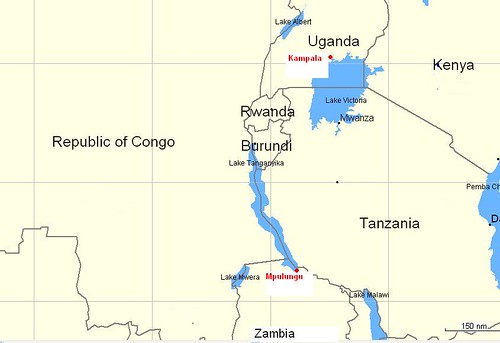 Mpulungu, you said?
Mpulungu, you said? Once upon a time, Mats and I went to Mpulungu. Mpulungu? I have to admit, I did not know where that was neither. Well, it is a town in North-Zambia, at the most southern tip of Lake Tanganyika.
El Nino had washed away most of the railway system in Tanzania, and we needed another route to bring in emergency food supplies to the refugee camps in West Burundi and Tanzania. We thought of trucking in the food cargo from Southern Africa using Mpulungu as a transit point before shipping it by barge via Lake Tanganyika up to Burundi.
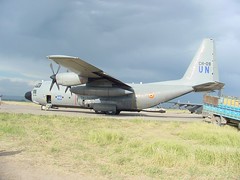 We did not have a base yet in Mpulungu, so we had to fly in the equipment to set up mobile warehouses, electricity and communications systems. As there were no commercial flights from our regional headquarters in Uganda to Zambia, we used a Belgian Air Force C130 Hercules plane, to pick up people and equipment.
We did not have a base yet in Mpulungu, so we had to fly in the equipment to set up mobile warehouses, electricity and communications systems. As there were no commercial flights from our regional headquarters in Uganda to Zambia, we used a Belgian Air Force C130 Hercules plane, to pick up people and equipment.So off we went, with a plane filled with cars, warehouse tents, generators, masts, and communications equipment. The C130 crew just came off a long tour of duty working for us doing food drops in Southern Sudan. Our delivery was the last trip they made before heading back home to Belgium, so there was a bit of a party atmosphere on the plane. They played 1960’s rock and roll music over the internal PA-system, as we flew over Rwanda, Burundi and Congo, heading south. The crew had rolled up the sleeves of their T-shirts, and were dancing on the cargo-deck. It reminded me of a scene in ‘Apocalypse Now’, minus the sound of the machine guns and shelling.
 As we flew on a military plane, we did not get landing clearance for the military airstrip near Mpulungu, and had to fly to other side of Zambia. We landed at Ndola, smack in the middle of the “Cupper Belt” as the southern part of DRC and North-West Zambia is called. It is always interesting to land at an airport where they have never seen a UN plane before. And certainly not one operated by the Belgian Air Force. But they were good guys, so immigration and customs formalities were a breeze.
As we flew on a military plane, we did not get landing clearance for the military airstrip near Mpulungu, and had to fly to other side of Zambia. We landed at Ndola, smack in the middle of the “Cupper Belt” as the southern part of DRC and North-West Zambia is called. It is always interesting to land at an airport where they have never seen a UN plane before. And certainly not one operated by the Belgian Air Force. But they were good guys, so immigration and customs formalities were a breeze.Mats and I loaded a Nissan Patrol 4x4 full of equipment, and headed off for a full day’s drive from Ndola to Mpulungu. We had bought some cheap tourist road maps at the hotel lobby in the morning, so we were in good shape. But the roads were not. El Nino rains had damaged the tarmac really bad, and we made it a point to fly over the potholes rather than negotiating our way around them, trying to make good time. Even so, we arrived in Mpulungu at two in the morning.
Mpulungu City.
Mats and I were still rookies in ‘the humanitarian world’, as this story will show in many ways. One of the mistakes was the planning. We thought to arrive in the late afternoon, and meet up at the port with Louis, one of our logisticians who arrived a couple of days earlier. But we had not counted on arriving at two in the morning… The port was closed, and the lights were dimmed all over Mpulungu, which had more of a village than a real town. As we cruised ‘around town’, trying to find a place to stay, we cursed ourselves not having noted the name of the hotel where we should stay. We asked a guy we saw strolling alongside the road, but he was clearly drunk and stumbled in the ditch as we were talking to him. Not much use to us. But sometimes luck favours the unprepared.
We saw a distant glow of light in the pitch dark town, and headed towards it. It was a camping site with a couple of tukuls, round huts for guests, called Nkupi Lodge. The music was playing loud as it turned out they were having a party for two girls working for FAO, our sister organisation, who just finished their two years’ tour of duty. As we shouted our questions over the music, we came to understand Louis was actually staying in one of the tukuls. What are the odds, hey?
There was no more room for us in the lodge, but the two FAO girls suggested we slept in one of their spare bedrooms, so off we went. After many drinks, and at 5 am.
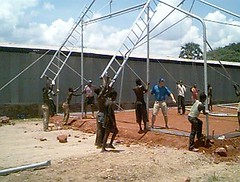 The next day, three hours later, we headed for the port to set up the equipment. By the time Valerian – a Ugandan technician from our team- and Zeff, one of our super duper logistics wizards arrived with another truck full of other equipment, a lot was already installed.
The next day, three hours later, we headed for the port to set up the equipment. By the time Valerian – a Ugandan technician from our team- and Zeff, one of our super duper logistics wizards arrived with another truck full of other equipment, a lot was already installed.I was quite used to the heat, living in Uganda for several years, but the Mpulungu temperatures surely beat the Uganda ones. And the humidity! As we were working outside in the sun, rigging up masts and dragging stuff in and out of the office container, we had to take regular breaks, bathing in sweat.
Reconnaissance
Zeff thought of also using another port off the Tanzanian side of Lake Tanganyika, and suggested Mats and I did a road reconnaissance along the lake’s shore to find a suitable landing site for the barges.
We agreed to leave very early in the morning, but when I knocked on his door at dawn, I was greeted by the pale remains of my old friend. His face all white. Bent over slightly, both hands on his stomach, he just said ‘Food poisoning’ before speeding off to the loo again. Still, Mats did not give up. Armed with a couple of water bottles, he got in the car, and off we went.
We used the same map we bought at the hotel lobby in Ndola, which showed Zambia on a scale of about ten inches. Not much detailed roads there.. But, after regular stops to ask the way to the Tanzanian border, we felt we were in good shape. The border itself was not much. Up on a mountain pass, in lush green fields, the road diminished into a dirt track.
The border was nothing more but an iron pipe over the track, with an old rusty sign “CUSTOMS” on it. Nobody in sight. We hooted a couple of times, and guy in torn pants and the remains of an official’s kaki-shirt showed up.
“Hallo”, we said.
“Eh, hello, Karibu! Welcome!”, he answered in half English-half Swahili. He looked with wide eyes at our 4x4 with “UN” painted in big white letters on the side.
“Are you the customs officer?”, we asked.
“No, but he is not here, can I help?”, he said.
We learned that the customs officer had gone on a walkabout many months ago, and had not come back yet. Since then, our good friend, had been ‘guarding’ the border post. He was helpful though, and chatted happily about the facts of life as he walked us to the customs’ office, nothing more than a hut in the middle of what looked like a small settlement. He chased the goats out of his office, and looked frantically for his papers and stamps. We wrote our entry in his logbook. The previous entry was from a few years ago, some overland-trekkers passing by. No wonder nobody had noticed the customs officer had disappeared, with all that border traffic!
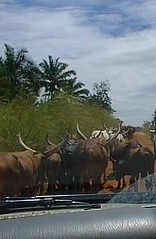 After an hour, we drove off. The vegetation was so dense it looked as if we were driving between walls of greenery, towering three, four meters high, on both sides of the track. Sometimes the track was so overgrown, we just hoped we did not speed off it. Several times, we had to hit the brakes as a herd of cattle appeared smack in the middle of the “road”, most of the time guarded by a young boy. Time and time again, the youngster would grab all his belongings and run off into the bush, shouting “Muzungu"! Muzungu!” (“White man, White man!”), leaving us stuck surrounded by the cows. It was clear cars were not a common sight there. Leave alone UN cars, driven by a couple of muzungus… Probably the poor guys thought they were invaded by European military troops or something.
After an hour, we drove off. The vegetation was so dense it looked as if we were driving between walls of greenery, towering three, four meters high, on both sides of the track. Sometimes the track was so overgrown, we just hoped we did not speed off it. Several times, we had to hit the brakes as a herd of cattle appeared smack in the middle of the “road”, most of the time guarded by a young boy. Time and time again, the youngster would grab all his belongings and run off into the bush, shouting “Muzungu"! Muzungu!” (“White man, White man!”), leaving us stuck surrounded by the cows. It was clear cars were not a common sight there. Leave alone UN cars, driven by a couple of muzungus… Probably the poor guys thought they were invaded by European military troops or something.The GPS indicated we were on the right track. Gradually, the bush cleared out, and we came in more open fields, driving through small villages until we reached a marsh like area. According to Mr.Garmin, we were just a few miles from our destination, but in front of us, the road was flooded by the water from the marsh.
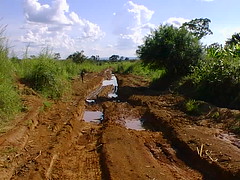 We carefully negotiated our way through the potholes which were probably half a meter deep. Until the unavoidable happened: the side of the car sank in the mud, and the car heeled over. The more we pushed on the gas pedal, the more the wheels spun, digging the car in deeper. Dammit. When we stepped out of the car, our feet sank into the mud, ankles deep. Only then we realized how badly we prepared this trip. Never again would we go on a road reconnaissance without a shovel, a decent bush cranking tool, and towing cables… We really left Mpulungu like we would go shopping in town.. Argh.. All too late now.
We carefully negotiated our way through the potholes which were probably half a meter deep. Until the unavoidable happened: the side of the car sank in the mud, and the car heeled over. The more we pushed on the gas pedal, the more the wheels spun, digging the car in deeper. Dammit. When we stepped out of the car, our feet sank into the mud, ankles deep. Only then we realized how badly we prepared this trip. Never again would we go on a road reconnaissance without a shovel, a decent bush cranking tool, and towing cables… We really left Mpulungu like we would go shopping in town.. Argh.. All too late now.And one thing was for sure: on our own, we would not get out of the mud. Not even with the help of the three-four guys who appeared from the fields, and tried to dig the wheels out. The more we dug, the more the car sank in the mud.
Luckily we had a shortwave radio in the car, so we called Zeff in Mpulungu. Zeff said to stay put and he would come to get us even though we were at least five hours drive from our base.
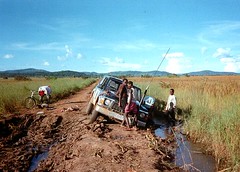 Meanwhile, Mats had taken refuge in the ditch, still throwing up. He was exhausted. It must have been a hilarious sight. Two muzungus, in their big car, stuck in the middle of the swamp, miles away from any sign of civilization. One sitting in the shade of the car, with his legs and clothes full of mud, the other one laying in the ditch, emptying his stomach for the umpth time.
Meanwhile, Mats had taken refuge in the ditch, still throwing up. He was exhausted. It must have been a hilarious sight. Two muzungus, in their big car, stuck in the middle of the swamp, miles away from any sign of civilization. One sitting in the shade of the car, with his legs and clothes full of mud, the other one laying in the ditch, emptying his stomach for the umpth time.As the sun was setting, we heard the distant sound of an engine. Could not be Zeff, too early. As by miracle, some locals appeared out of bloody nowhere, on a tractor. I had never been so happy to see a tractor. And sure enough, they had towing cables with them. In less than half an hour, they pulled the car out of the mud, we made a U-turn, and followed the tractor up to the next village.
I always wear a safari jacket. And in the back pocket, I keep a paper bag (actually an air sickness bag from ‘Virgin Atlantic’ – but that is a different story), filled with ‘funny money’, left-over money from my previous field trips. I found some old Tanzanian banknotes, and the guys from the tractor were all too happy with them. They invited us to stay with them for the night, but we could not, had to drive back.
How to fix a broken axle using a computer bag.
We tried to call Zeff on the radio again, to warn him we were ok, so he could turn around. In vain though. Boy, he was going to be pissed off to discover he did the trip for nothing.. As we were speeding back, in between villages, cows, goats and other unidentified moving and/or flying objects, the night fell. After each bend in the road, we thought seeing the lights of Zeff’s car, but each time it was a distant camp fire from one or the other village. Villages we had not seen during the day, as they were hidden behind the bushes. But all of sudden, Zeff’s car came steaming out of the jungle, right in front of us. We both hit the brakes and stopped inches from eachother. Reason the more for Mats to throw up again. Poor guy…
Nope, Zeff was not pissed off. He was happy to see us again. He gave us a walkie-talkie so we could keep in contact as we drove back. Three hours later, we reached the Zambia-Tanzania border post on the mountain pass again. Somewhere along the road, we had lost sight of Zeff though, and even looking down the slope, I could not trace any light.. Guess we drove a lot faster than him. We tried to reach him on the walkie-talkie, but nothing.. Meanwhile, the customs official was nowhere in sight. In the light of our beamers we walked to the small settlement and banged on the doors of the mud houses. After half an hour, we found our man, who clearly had passed the evening boozing. He probably had good reason to celebrate, though: two cars with muzungus passing his border post in one day must have been THE event of his life… A pity he was nearly unconscious for the third passage of the muzungus that day…
While he stood there negotiating his balance, I filled in the log again, stamped the passport ourselves, and passed the border. We drove up a small ridge and tried to spot Zeff again. Nothing but a pitch dark night dotted with campfires for as far as we could see. A nice sight though, the pitch dark. Had not seen that since a long long time.. In Belgium, or where we lived in Kampala, there was always light around, but this, this was pitch-pitch dark. Dark like hell. Or heaven.. The starry skies reminded me of those during our expeditions in the Pacific and the Antarctic. But we did not give much room to these romantic thoughts.. Maybe Zeff had an accident.
In the end, we got onto the roof of the car, and opened up the squelch of the radio, and only then we could barely hear Zeff call us in the middle of the radio noise. We understood he had some car trouble.
So off we went again. Back into Tanzanian territory. Did not bother to go through customs again. Figured they would not come chasing after us ‘illegal immigrants’ neither. It took an hour to reach Zeff. It was not a pretty sight. We only saw a pair of legs sticking out from underneath the car. Legs belonging to a guy who cursed like an old seadog. Apparently the cross axle connecting the front and back axles of the car got stuck, so his wheels were blocked. Zeff had disconnected the cross axle already from one side while he was waiting for us, but could not connect it from the front axel. So what to do? He had no power going onto his wheels, and we could not tow him as the cross axle was dragging over the ground…
Luckily Mats – who had vomited his last fluid hours ago – was back into intellectual shape, and came up with the bright idea to tie the cross axle onto the bottom chassis of the car… with the strap of his computer bag… I guess that is not what Mr Dell or Mr Targus had in mind for a computer bag strap, but it seemed to work. Next challenge was that Zeff had a tow cable of two meters only… Ever tried to tow a car through the bush, potholes, over mountain ridges, and through streams with a two meter long towing cable? I tell you, that is SHORT, leaving barely one meter between the two cars ! So short, Zeff was on the walkie-talkie all the time, giving orders to us, in the front car: ‘faster, slower, ease off, go left, go right’. And sometimes ‘stop’ as the computer-bag-strap got disconnected again and the axle dragged over the ground. Each time we had to walk back in the light of a handheld flashlight, trying to find the strap in the mud.
It took us the main part of the night to get to the customs post again. By then, we did not wake up the guys anymore, we just stamped our passports ourselves.. And down the mountain we went, hoping Zeff’s brakes would not give up, having him crash into the back of our car.
At 5 am the next morning, two UN cars drove, ever so slowly, one closely behind the other one, into Mpulungu town. All passengers Muzungus, covered with mud. As we got out of the car, Zeff gave us an evil eye and raised a finger: “Next time, next time!”… We knew: Next time, we had to prepare better, take proper bush equipment, drive slower in a convoy, and and, and, and…
But the story does not end here.
A week later, a small Beechcraft twin engine plane was to come over and fly us back to Kampala. This time, we had received a landing permit for the military airport near Mpulungu. For hours, we monitored the agreed shortwave radio frequency where the plane would call us as they approached, but heard nothing. As we drove off to the airport, we heard a strong interference on the radio and found the aircraft was transmitting slightly off frequency. They answered our call with: “Ah there you are! We have been circling overhead for an hour already, as we don’t have the VHF frequencies for the military control tower. Go and get it! We need to land fifteen minutes, as fuel is running low!”.
I
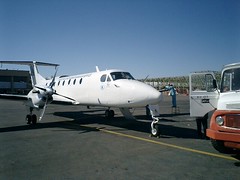 still don’t know how we managed to negotiate our way through the military checkpoint at the airport, but somewhere waving my blue UN passport and using a lot of important words got us into the office of the base commander in no time. Sometimes it helps being the only muzungus in a radius of a hundred miles! By the time the plane landed, the pilot said he was ‘flying on fumes’ already.. Anyway, the guys at the airport were all too helpful, invited us over for tea and a chat as the plane was being refueled. They even gave us a discount for the fuel.
still don’t know how we managed to negotiate our way through the military checkpoint at the airport, but somewhere waving my blue UN passport and using a lot of important words got us into the office of the base commander in no time. Sometimes it helps being the only muzungus in a radius of a hundred miles! By the time the plane landed, the pilot said he was ‘flying on fumes’ already.. Anyway, the guys at the airport were all too helpful, invited us over for tea and a chat as the plane was being refueled. They even gave us a discount for the fuel.On the way back, we zigzagged in between towering storm clouds filled with lightning, with the pilot of our small plane going ‘Oh my god’ and ‘Oh shit, shit!’ the whole time. Not a pretty sight.
Hours later, many hours later, we finally landed at Entebbe airport. We parked right next to Airforce One, as apparently President Clinton had just landed. But that was minor news, compared to the stories of our adventures in Mpulungu we told our families that evening!
Continue reading The Road to the Horizon's Ebook, jump to the Reader's Digest of The Road.
 Peter. Flemish, European, aid worker, expeditioner, sailor, traveller, husband, father, friend, nutcase. Not necessarily in that order.
Peter. Flemish, European, aid worker, expeditioner, sailor, traveller, husband, father, friend, nutcase. Not necessarily in that order.
0 comments:
Post a Comment